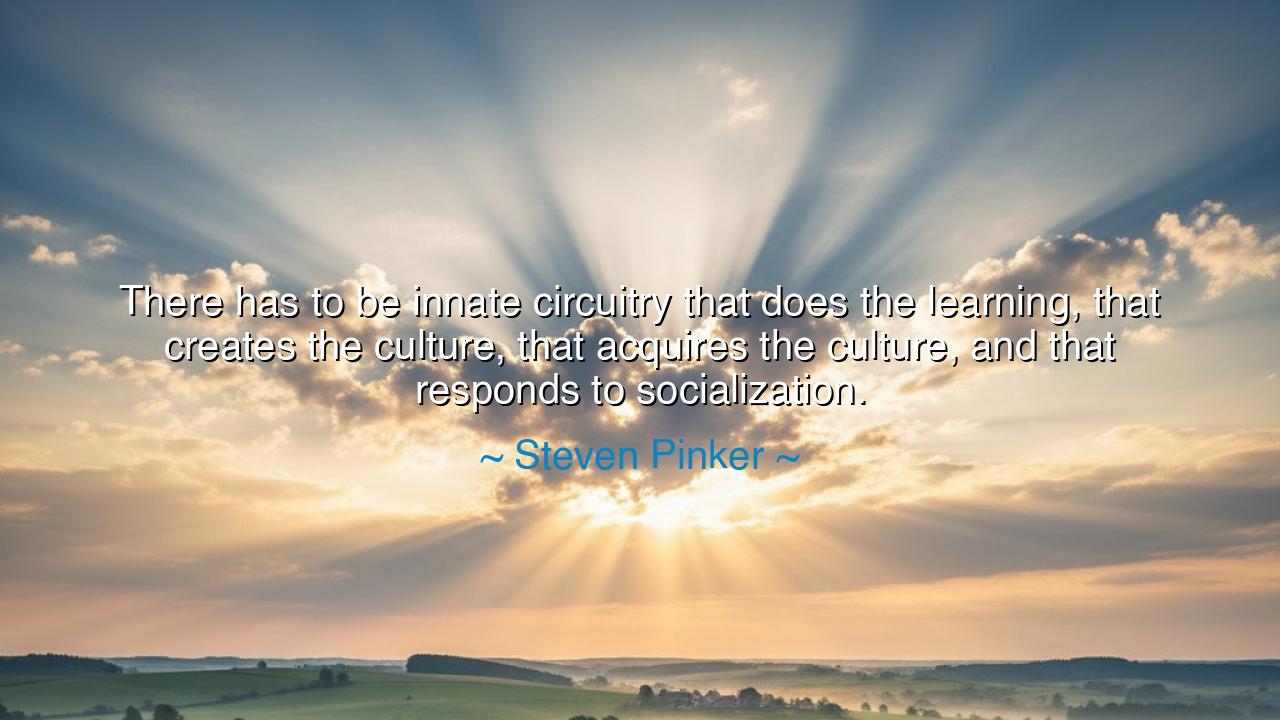
There has to be innate circuitry that does the learning, that
There has to be innate circuitry that does the learning, that creates the culture, that acquires the culture, and that responds to socialization.






The words of Steven Pinker — “There has to be innate circuitry that does the learning, that creates the culture, that acquires the culture, and that responds to socialization.” — speak to the mysterious bond between nature and nurture, between what is born within us and what we absorb from the world around us. In his insight lies the revelation that humanity is not a blank slate; we are vessels fashioned by both biological design and cultural inheritance. There is something ancient and sacred in this truth — that deep within the folds of the mind dwell the innate circuits of learning, the primal spark that allows us to think, to create, to belong.
From the dawn of our species, man has stood between two fires — one burning within, one burning without. The fire within is the instinct, the coded wisdom of the ancestors written into our very flesh. The fire without is culture, the collective dream of humankind, carried from generation to generation like a torch that never dies. Pinker reminds us that these two fires are not separate; the inner fire fuels the outer flame. Without the inner circuitry — the natural inclination to mimic, to question, to feel — there would be no art, no language, no civilization. We would be as silent as the stones from which we once struck our first sparks.
Think of the child, newly born, whose mind is empty of words but full of potential. No one teaches it to cry, to cling, to seek the warmth of a mother’s arms. These are the ancient codes awakening. Yet, as it grows, the child learns to speak, to laugh, to dance according to the rhythms of its people. It absorbs the culture around it, not through force, but through resonance — because the circuitry for learning and social connection already lives within. Just as the seed knows how to reach for the sun, the human mind knows how to reach for meaning.
History offers us the luminous figure of Helen Keller, who, though deprived of sight and sound, found her way into the world of thought and speech through the guidance of her teacher, Anne Sullivan. What miracle allowed her to learn without seeing or hearing? It was not mere instruction — it was the awakening of her innate human circuitry. Deep within her silent world, the mind yearned to connect, to symbolize, to share. When she first understood that the movement of Anne’s hand in water meant the word “water,” she did not simply learn a word — she entered the realm of culture, the shared human code of meaning. Her triumph is proof that the roots of learning are not given by the world, but born in the soul.
Culture, then, is not imposed — it is grown. It blooms when the soil of the mind meets the rain of experience. Pinker’s insight is a call to honor the structure of our own humanity. Within us lies a temple of design — neurons that mirror emotion, circuits that crave pattern, and a will that seeks connection. To live wisely is to cultivate this inner garden, to use the natural architecture of our mind to build bridges of understanding rather than walls of ignorance.
But beware: when societies forget the inner nature of learning, they attempt to mold man as if he were clay without form. They impose ideologies that crush the innate impulse of curiosity and wonder. True wisdom teaches us that we must guide, not control, the mind’s natural flow. Just as a river carves its path through stone, human learning shapes itself when given freedom to explore, to imitate, to fail, and to rise again. The greatest civilizations — Greece, India, China — all flourished because they honored the dance between human instinct and cultural creation.
Therefore, O seeker of truth, remember this: you are not merely shaped by the world — you are a creator of it. Within your being lies the circuitry of civilization itself — the power to learn, to build, to empathize, to dream. Use it wisely. Engage with others; listen deeply; pass down what you know. For every conversation, every act of teaching, every moment of compassion is part of the eternal network that binds us all — the living web of culture, born from the spark of mind.
Let Pinker’s words echo across generations: to learn is divine, to connect is eternal. Honor your nature, nurture your world, and never forget that within you burns the same light that once taught mankind to speak, to write, to love, and to reach for the stars.






AAdministratorAdministrator
Welcome, honored guests. Please leave a comment, we will respond soon